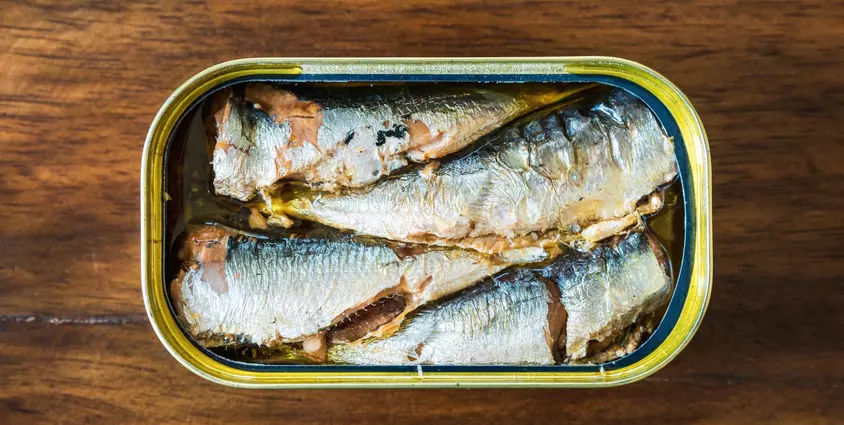Can Dogs Eat Sardines?
- 26 Jun 2024
- 4m read

Yes, dogs can eat sardines.
Is it OK for Dogs to Eat Sardines?
Yes, it is generally safe for dogs to eat sardines.
Sardines are a nutritious source of omega-3 fatty acids and protein, which can benefit your dog's overall health, including their skin and coat. However, it's important to feed sardines to your dog in moderation to avoid excessive intake of calories and nutrients. Always check the label to ensure there are no added ingredients like salt or seasonings, which could be harmful to your dog.
Can Dogs Eat Sardines with Bones?
Yes, dogs can eat sardines with bones.
In fact, sardine bones are soft and small, making them safe for most dogs to chew and digest without any issues. These bones can even contribute to your dog's dental health by helping to clean their teeth naturally.
Can Dogs Eat Sardines in Tomato Sauce?
No, dogs should not eat sardines in tomato sauce.
Tomato sauce often contains added ingredients like onions, garlic, salt, and other seasonings that can be harmful to dogs. These ingredients can potentially cause digestive upset, toxicity, or allergic reactions in some dogs.
Can Dogs Eat Sardines in Sunflower Oil?
No, dogs should not eat sardines in sunflower oil.
Sunflower oil is high in fat and calories, which can lead to weight gain and potentially upset your dog's stomach, especially if they have a sensitive digestive system. Additionally, the high-fat content may not be ideal for dogs with certain health conditions, such as pancreatitis.
Can Dogs Eat Sardines in Olive Oil?
No, dogs should not eat sardines in olive oil.
Similarly to sunflower oil, it's not recommended to feed dogs sardines packed in olive oil due to the high fat content and calorie density, which can lead to weight gain and digestive issues.
Can Dogs Eat Sardines in Brine?
No, dogs should not eat sardines in brine.
Brine contains high levels of sodium, which can be harmful to dogs if consumed in excess. Too much salt can lead to dehydration, electrolyte imbalances, and even salt poisoning.
Are Sardines Good for Dogs?
Sardines are beneficial for dogs due to their high levels of omega-3 fatty acids, which support heart health, joint function, and skin/coat health. They also provide essential protein, vitamins, and minerals, making them a nutritious addition to a dog's diet when fed in moderation and without added oils or seasonings.
Benefits of Sardines for Dogs
Sardines offer several health benefits for dogs due to their nutrient-rich composition:
Omega-3 fatty acids
Sardines are an excellent source of omega-3 fatty acids, particularly EPA and DHA. These essential fatty acids support cardiovascular health, reduce inflammation (beneficial for dogs with arthritis or allergies), and promote brain function.
Protein
They are a high-quality protein source, crucial for muscle development, repair, and overall body function.
Vitamins and minerals
Sardines contain vitamins such as vitamin D (important for calcium absorption and bone health) and vitamin B12 (essential for nerve function and red blood cell production). They also provide minerals like calcium, phosphorus, and selenium, which support bone strength and metabolic processes.
Healthy skin and coat
The omega-3 fatty acids in sardines contribute to a shiny coat and healthy skin, helping to alleviate dryness and itchiness.
Joint health
Omega-3s have anti-inflammatory properties that can benefit dogs with joint issues, improving mobility and reducing discomfort.
Low contaminant levels
Sardines are small fish that typically have lower levels of contaminants such as mercury compared to larger fish species, making them a safer choice as a seafood option for dogs.
Things to Consider Before Feeding Sardines to Dogs
Before introducing sardines into your dog's diet, it's important to consider several factors to ensure their health and well-being:
Allergies
While rare, some dogs may be allergic to fish, including sardines. Watch for symptoms such as itching, swelling, or gastrointestinal issues after feeding sardines. If any signs of allergy appear, discontinue feeding and consult your veterinarian.
Bones
Sardines typically have small and soft bones that are safe for most dogs to consume. These bones can actually provide dental benefits by helping to clean teeth and massage gums.
However, always check for any large or sharp bones that could pose a choking hazard or cause gastrointestinal obstruction. If unsure, opt for boneless sardines or those with very soft bones.
Preparation
Choose sardines packed in water rather than oil or sauces. While oils can add flavour and nutrients, they also increase calorie intake and may contain unnecessary fats or additives that can upset your dog's stomach. Plain water-packed sardines are a healthier option.
Moderation
Sardines are rich in nutrients like omega-3 fatty acids, protein, vitamins, and minerals. However, they are also calorie-dense and high in fat. Overfeeding sardines can lead to weight gain, especially in less active dogs or those prone to obesity.
Feed sardines as an occasional treat or part of a balanced diet, taking into account your dog's size, activity level, and overall calorie needs.

.webp)


